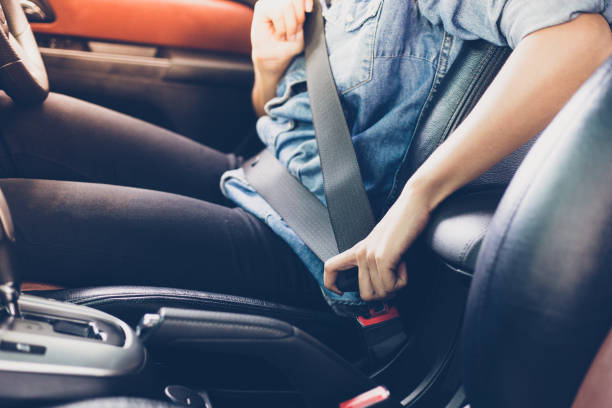
By: Leslie S. Harkavy, Esquire
This blog will explore the history of the seat belt law in Massachusetts, why we wear seat belts, and how the decision to wear a seat belt, or not, may impact your personal injury case.
- Why do we have to wear seat belts?
It was not always the law for passengers in motor vehicles to be required to use seat belts in Massachusetts. Who remembers the “Click it or Ticket” road signs appearing all over the Massachusetts Pike? “Click it or Ticket” still is a National Highway Traffic Safety Administration campaign aimed at increasing the use of seat belts among young people in the United States. The focus of the campaign on youth was due to the statistics showing a greater frequency of non-seat belt users in the younger generation. The campaign relied heavily on targeted advertising aimed at teens and young adults. The “Click it or Ticket” campaign has existed at the state level for many years. It began to appear in Massachusetts about the time seat belts were becoming mandatory.
Before 1980, only 11% of people in the United States used seat belts. New Hampshire had the historically lowest seat belt usage. Massachusetts, surprisingly enough, was the state with the second lowest usage.
Opposition to the effort to enact seat belt laws in Massachusetts was primarily based on the belief that requiring wearing of a seat belt is a violation of civil rights.
However, the safety statistics are hard to ignore. It was estimated that seat belts saved an estimated 14,955 lives in 2017 and an additional 2,549 lives could have been saved with 100% seat belt use. Roughly 2 out of every 4 teenagers involved in a fatal crash were not wearing a seat belt including drivers and passengers. In fatal crashes, teen drivers were more likely to be buckled up than teen passengers (49% vs 35%). Overall, passengers have lower rates of seat belt use for all ages. Seat belt use continues to be the lowest among back seat passengers.
Among Massachusetts drivers and front-seat passengers, safety belts reduce the risk of death by 45%, and cut the risk of serious injury by 50%. In Massachusetts in 2017, the safety belt usage rate was 73.8%.
The research showed that without a doubt, safety belts can help in a crash. They stop you from hitting the windshield, dashboard, steering wheel or other hard parts of the vehicle. Your vehicle will stop moving if it crashes head on. If you are not wearing a safety belt, your body will continue moving until it hits something hard like the windshield. Your safety belt will stop you from hitting the windshield or other passengers.
- What is the Massachusetts Law regarding seat belts?
At this point in time in Massachusetts, the new seat belt law isn’t so new anymore. Massachusetts was one of the last states to pass a seat belt law. The seat belt law became effective on July 1, 1994. While some of us recall seeing a Click it or Ticket campaign in their towns, we may not remember exactly how the seat belt law works in Massachusetts.
The Massachusetts seat belt law specifically requires every person in a passenger motor vehicle to wear a safety belt or sit in a child passenger restraint. MGL c. 90, Section 13A. The law states in part as follows: “No person shall operate a private passenger motor vehicle or ride in a private passenger motor vehicle, a vanpool vehicle or truck under eighteen thousand pounds on any way unless such person is wearing a safety belt which is properly adjusted and fastened; …”
Further, any driver who is stopped by a law enforcement officer for a traffic violation and is not wearing a safety belt can be fined $25.
In Massachusetts, any child under the age of 8 and less than 57 inches tall must be in a car seat or booster seat when in a moving vehicle.
Additionally, Massachusetts law says that you cannot get pulled over by the police for failing to wear a seat belt. Seat belt use is considered a secondary offence in Massachusetts, meaning that an officer must have a reason (other than the driver not wearing a seat belt) to pull the driver over. Failing to wear a seat belt cannot be the primary reason for a traffic stop by the police. Because failing to wear a seat belt is not a primary offence, it follows then that you cannot be pulled over while driving for not wearing a seat belt. Because failing to wear a seat belt is not a primary reason to be pulled over, the Massachusetts seat belt law is not as harsh as in other states. It should be noted that these rules also apply to children.
So “Click it or Ticket” in Massachusetts alone, is a little misleading. Yes, it is the law in the Commonwealth that you must wear your seat belt, but No – you won’t get stopped by a policeman, solely for not wearing one.
- What happens when you are injured in an accident but did not wear your seat belt in Massachusetts?
The best way to protect yourself in a crash is to always wear your safety belt. Safety belts save lives for both drivers and passengers. During a crash, being buckled up helps keep you safe and secure inside your vehicle. Airbags are designed to work with safety belts and do not replace them. If you are not doing this already, get in the habit of putting your safety belt on every time you get into a vehicle, and ask your passengers to buckle up.
In Massachusetts, the violation of the child seat rules is inadmissible as evidence of contributory negligence in any civil action. M.G.L.A. 90 § 7AA. This law states as follows:
“ A passenger in a motor vehicle on any way who is under the age of 8 shall be fastened and secured by a child passenger restraint, unless such passenger measures more than 57 inches in height. The child passenger restraint shall be properly fastened and secured according to the manufacturer’s instructions.
Unless required to be properly fastened and secured by a child passenger restraint under the preceding paragraph, a passenger in a motor vehicle on any way that is under the age of 13 shall wear a safety belt which is properly adjusted and fastened according to the manufacturer’s instructions. …
A violation of this section shall not be used as evidence of contributory negligence in any civil action. …
Similarly, the fact that a victim is not wearing a seat belt is insufficient to be submitted to a jury, unless the failure to wear a seat belt was causally related to her injuries. Shahzade v. C.J. Mabardy, Inc., 586 N.E.2d 3 (Mass. 1992).
So even if you are in an accident, the failure to wear a seat belt cannot be used the child. In addition, evidence that someone has not worn a seat belt cannot be held against them unless the failure to wear a seat belt was causally related to the injuries sustained.
In the case of Shahzade v. CJ Mabardy, Inc., the plaintiff was not wearing a seat belt at the time of the accident. The judge found the failure to wear a seat belt was insufficient to warrant submission to the jury on the issue of comparative negligence. There was no evidence that plaintiff’s failure was causally related to her injuries. In the absence of any such evidence, the judge properly refused to submit the issue to the jury, as the jury would have been left to speculate as to whether the plaintiff’s failure to wear her seat belt contributed to her injuries. See, Zezuski v. Jenny Mfg. Co., 363 Mass. 324 (1973)
4. Conclusion
In Massachusetts, you are required to buckle up for safety riding in a vehicle. Statistics are overwhelming that failure to wear a seat belt leads to increasingly higher numbers of deaths and serious injuries if you are injured in a car accident. Despite the requirement to wear a seat belt in Massachusetts, you can’t be pulled over by police simply for not wearing a seat belt. There has to be another reason the cops pull you over such as running a red light or speeding. Only then can the police ticket you for failure to wear a safety restraint.
If you are injured in an accident not wearing a seat belt, generally the failure to wear your seat belt cannot be used against you in your claim for personal injury against the responsible driver. However, there is a narrow exception where there is evidence that failure to wear the seat belt contributes to the nature or extent of the injuries suffered. In practice, if there is evidence that the injuries were worse and would have not been sustained if a seat belt was worn, then the fact you did not wear a seat belt may be used against you. This usually requires expert testimony whereby a doctor would testify about the injuries suffered due to failure to wear a seat belt.
When someone is injured in a motor vehicle accident, whether you are wearing your seat belt or not, it is important to contact a local personal injury law firm to discuss your rights. As a victim of an accident, make sure everything is done to protect your interests. The lawyers at Nadeau Harkavy LLC help victims and their families recover compensation in serious injury and wrongful death cases arising from car crashes and other accidents. If you have any questions about your legal rights relating to a car accident, wrongful death or other accident, feel free to contact us for a free consult today at 617-674-7640.
Meet The Lawyers
With 60 years of combined experience serving injured victims in Massachusetts, our team has collaborated for nearly two decades, delivering a proven track record of outstanding results for clients. Guided by a philosophy of treating clients as we would our own family, we strive to ease our clients' journey from the initial phone call to case resolution. Committed to competing and fighting vigorously, we aim to hold insurance companies accountable to the fullest extent of the law. Our belief in close communication ensures the best possible outcomes, and our approachability makes us readily available to you. Entrust us with your case, allowing you to focus on your physical, emotional, and financial recovery.
Massachusetts Personal Injury Lawyers
Massachusetts Personal Injury Lawyers with over 60 Years Combined Experience Representing Those Injured in Accidents.












